Ines is a Senior Web3 Writer at Cryptonews. She writes research-driven, value-packed guides and reviews covering cryptocurrencies, exchanges, and other Web3 topics. Ines is constantly on the lookout…
Anonymous wallets are designed to protect your privacy and identity. They prevent intrusive verification and allow you to keep full control of your funds while minimizing the risk of personal data misuse.
According to our analysis, the best anonymous crypto wallets in 2025 are Best Wallet, Zengo, Ellipal, Ledger, and Trezor. We reviewed over 30 no-KYC crypto wallets from a user perspective based on a hands-on research methodology to select our top picks. This approach ensures our list of the best crypto wallets with no ID verification is unbiased and reliable.
Best Wallet
Overall Best Crypto Wallet
Overall Best Crypto Wallet
Margex Wallet
Multicollateral Wallet With Low Trading Fees
Multicollateral Wallet With Low Trading Fees
Cypherock X1
Best For Seedless, Hardware-Based Storage
Best For Seedless, Hardware-Based Storage
Zengo
Safe Wallet with Staking and dApps
Safe Wallet with Staking and dApps
Ellipal Titan
Cold Wallet with Most Tokens Supported
Cold Wallet with Most Tokens Supported
Ledger
Best Hardware Wallet for Security
Best Hardware Wallet for Security
Here’s a head-to-head comparison of the leading anonymous crypto wallets for 2025:
We’ll now review the best anonymous crypto wallets compared above. We’ll cover everything you need to know about each wallet, such as security, privacy features, supported networks, and pricing.
Best Wallet is the best anonymous crypto wallet of 2025. You can use it without providing personal details like ID or email through features like alias-based wallet addresses, decentralized exchange (DEX) integration, and encrypted private key backups.

This multi-chain, non-custodial wallet supports over 1,000 assets across 60+ blockchains, including majors like Bitcoin, Ethereum, and Solana and more niche ones like Algorand and Toncoin. You also get extra security features such as two-factor authentication and biometrics, giving you an additional level of protection.
Furthermore, Best Wallet offers a native utility token, $BEST, that provides benefits like no gas fees and regular airdrop rewards for active users. We also loved the presale dashboard for early access to promising crypto presales and the real-time market sentiment analysis based on social media. While the wallet lacks a browser extension, it’s highly functional on iOS and Android.
Best Wallet Key Takeaways
Pros
Cons
The Margex Wallet is a great choice for those who wish to trade and manage cryptocurrencies without KYC. From newer coins such as Jupiter and Theta to established ones like Bitcoin and Ethereum, it supports more than 50 cryptocurrencies. It’s ideal for traders of all skill levels, offering tools such as staking, leverage trading, and an all-in-one app that lets you buy, sell, or withdraw your crypto without switching platforms.
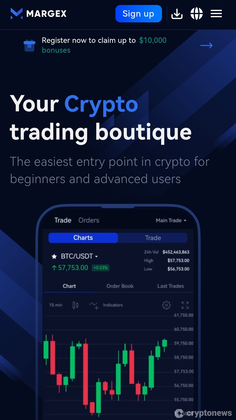
However, Margex stood out during our assessment with its excellent copy trading feature. You can follow over 100 pro traders, each with their unique trading style and risk appetite. We also liked the Smart Follow feature, which guarantees copy trades are executed immediately, giving you and the trader you follow the same entries and exits.
User funds on Margex are stored in a multisig offline wallet, which is monitored 24/7 to keep your funds safe. Additional features like email alerts, SSL encryption, and two-factor authentication further protect your account.
Margex Wallet Key Takeaways
Pros
Cons
If you’re after serious security and don’t want to deal with KYC, Cypherock is a solid choice. The way it handles your private keys is unique: instead of keeping them in one place, Cypherock splits them into five parts and stores each on a different, tamper-proof card. So, you can lose up to three cards, and your funds will still be safe.
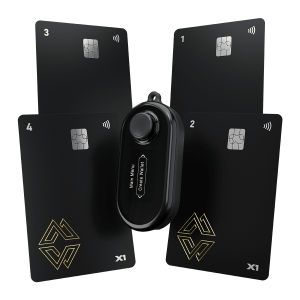
You won’t need a seed phrase backup with Cypherock, which makes things easier, and the CySync app lets you manage your crypto, NFTs, and DeFi assets in one place. We also love that it lets you create up to four different wallets, each with a unique seed phrase for easy portfolio management and diversification, as well as maximum security.
The wallet even includes a beneficiary feature, so your assets can be securely transferred to someone else if something happens to you. A small drawback we should note, though, is the relatively steep starting price of $131, which may deter budget-conscious users.
Cypherock Key Takeaways
- Wallet Type: Hardware wallet
- Storage Type: Cold storage with decentralized key distribution
- Cryptocurrencies Supported: Over 1,000, including Bitcoin, Ethereum, and altcoins
- Cost: $131.97
- Top Security Features: Decentralized key storage, no seed phrase needed, tamper-proof EAL6+ cards, PIN protection
Pros
- No KYC verification needed
- Keeps your assets safe with decentralized key storage
- Works with a huge range of cryptocurrencies, NFTs, and DeFi
- Includes a beneficiary feature to ensure your assets are passed on securely
Cons
- At $131, it might feel pricey for some
- The CySync app offers relatively basic features
4. Tangem – Best for Beginners
Tangem is a card-based hardware wallet that keeps things refreshingly simple. Entirely offline, Tangem ensures that no personal data is ever at risk. Your private keys are stored securely on the card itself, thanks to an EAL6+ certified chip. What particularly impressed us about Tangem is how easy it is to use – the setup takes less than a minute, and managing your crypto is as simple as tapping the card.
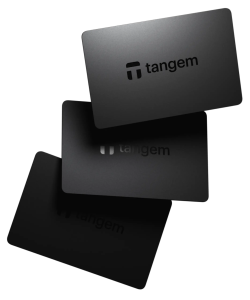
The Tangem app lets you buy, sell, swap, or stake over 1,000 cryptocurrencies to earn passive income, including Bitcoin and Ethereum. Unlike software wallets like Exodus, Tangem does away with the hassle of seed phrases. Instead, it provides three backup cards to ensure you never lose access to your funds. Just be careful not to misplace those cards, as they’re the key to your assets.
Tangem is ideal for those who want a straightforward way to manage their crypto without undergoing KYC. While the card-based system might take some time getting used to, it’s worth it for the portability and security it offers. If you’re looking for an anonymous, no-frills solution to store and manage your crypto, Tangem might be exactly what you need.
Tangem Key Takeaways Pros Cons Zengo is a top choice for anonymous crypto wallets in 2025, largely due to its use of Multi-Party Computation (MPC). This technology eliminates the need for seed phrases, splitting your private keys into two parts – one on your device and another on Zengo’s servers. This ensures no single entity controls your private data, significantly enhancing anonymity and security. Additionally, the wallet provides complete self-custody over your assets, ensuring you have full control. Zengo has never been hacked since its launch in 2018, thanks to its combination of MPC, biometric login, and 3-factor authentication (3FA). It’s designed to be beginner-friendly, and you can buy, sell, and store over 380 assets, including Bitcoin and NFTs, all from the app. The Pro version includes advanced features like generational inheritance and a Web3 firewall for enhanced protection. Despite missing support for some major assets like Solana, Zengo remains a highly secure and convenient wallet for Bitcoin users and beyond. Zengo Key Takeaways Pros Cons The Ellipal Wallet is one of the best anonymous cold wallets of 2025 due to its fully air-gapped design. It achieves anonymity by eliminating any wired or wireless connections, making it impossible for hackers to access your assets or personal data remotely. All transactions occur via QR code scans, and firmware updates are done through a MicroSD card, keeping the wallet offline at all times. This cold wallet supports over 10,000 coins and tokens, making it versatile for secure, KYC-free storage. Ellipal offers the Titan 2.0 and Titan Mini, both built from a single metal block with a sealed touchscreen for durability and protection. Ellipal ensures your private keys never touch the internet, enhancing security for long-term asset storage. It also includes an in-built exchange through its mobile app, allowing you to swap cryptocurrencies in-app. We also found its support of 200+ dApps impressive, with easy access to crypto gaming and DeFi services via MetaMask and Wallet Connect. However, while the QR-based transaction process enhances security, it may feel slow for frequent users. Ellipal Key Takeaways Pros Cons Ledger achieves anonymity by keeping your private keys offline and protected with a Secure Element chip technology, preventing unauthorized access. It also doesn’t require KYC, so you can manage your crypto without revealing your identity. Ledger’s cold storage feature, coupled with offline protection, ensures that your assets are safe from both online and physical threats. Ledger offers two entry-level models: the Ledger Nano S Plus ($79) and the Ledger Nano X ($149). The Ledger Nano X supports over 5,500 cryptocurrencies and integrates with DeFi and NFT applications. It offers mobile connectivity through Bluetooth, which is a unique feature among hardware wallets. If you prefer simplicity, the Nano S Plus is a budget option that still delivers on security. If you’re after its top-tier models, you can also pick between Ledger Flex and Ledger Stax, priced at $249 and $399, respectively. We found Ledger ideal for long-term storage, thanks to its offline protection and 2FA. It uses a 24-word seed phrase for recovery, with the option for an additional passphrase. Although its software isn’t fully open-source, its security features are robust, making it one of the most trusted wallets for serious investors. Ledger Key Takeaways Pros Cons Trezor achieves anonymity by not requiring KYC and deleting your personal data, such as name and address, from its online store 90 days after purchase. The device securely stores your private keys offline in cold storage, ensuring they never touch the internet. In addition, Trezor’s open-source firmware allows full transparency, which means you can audit its security measures yourself, adding trust for those concerned about privacy. Trezor provides four models: Model One ($49), Safe 3 ($79), Model T ($149), and Safe 5 ($169), all of which support thousands of coins and tokens. Lacking native staking, NFT management, and a mobile app or Bluetooth connection, Trezor is a simple yet highly reliable anonymous wallet. The Model T includes Shamir Backup for enhanced security, and you can access advanced features through third-party software. Trezor integrates with popular wallets like Exodus, providing flexibility and convenience. Overall, its simplicity, affordability, and open-source approach make it a reliable choice among no-KYC hardware wallets. Trezor Key Takeaways Pros Cons The Blockstream Jade ensures anonymous crypto storage by not requiring KYC verification. It also facilitates offline cold storage, keeping your private keys away from the internet, and is fully open-source, which allows the community to audit its security measures. Launched in 2021 and priced at $79, this wallet focuses primarily on Bitcoin and Liquid Network assets, offering multi-signature security with Electrum and Shamir Backup for seed recovery. The device’s open-source firmware further enhances transparency and trust. Blockstream Jade is compact and budget-friendly compared to pricier competitors like NGRAVE. Despite its small screen and lack of microSD backup, Jade offers excellent value with its robust security features and ease of use. Another key reason we rank it among the best anonymous wallets is that you can buy it with Bitcoin, which adds an extra layer of privacy. Learn more by watching our Blockstream Jade tutorial. Blockstream Jade Key Takeaways Pros Cons The NGRAVE wallet is a popular anonymous crypto wallet that doesn’t require KYC, ensuring maximum privacy. It uses air-gapped technology, which keeps it completely offline, making it immune to remote hacking. This device also offers real-time key generation using a unique light-based system, adding a physical security layer. The NGRAVE wallet is highly secure, with military-grade encryption and biometric features like fingerprint scanning. We also liked its large touchscreen, which allows easy navigation and makes it user-friendly despite the advanced crypto security setup. Although it’s the priciest hardware wallet on our list, NGRAVE stands out with its extensive crypto support and robust build. It supports a wide range of cryptocurrencies and is built to withstand harsh conditions, being both water- and dust-resistant. For those seeking top-tier security, NGRAVE is worth the investment. NGRAVE Key Takeaways Pros Cons The SecuX W20 doesn’t require KYC and uses an air-gapped design for offline key storage. It uses a CC EAL5+ Secure Element chip to protect your private keys from online threats. This design ensures that your keys never leave the device, maintaining complete privacy. Priced at $119, the SecuX W20 supports a whopping 10,000+ tokens, including Bitcoin, Ethereum, and Solana. We particularly enjoyed its large and responsive color touchscreen display and intuitive interface, which make managing assets straightforward. With Bluetooth and USB connectivity, the wallet is compatible with MetaMask and DeFi platforms, enhancing its versatility. The SecuX W20 doesn’t skimp on security either, offering dynamic PIN entry and passphrase support for extra protection. You can easily view your portfolio and verify transactions directly on the device. And with a QR-based WalletConnect integration, it simplifies access to decentralized apps, making it a solid choice for secure and anonymous crypto management. SecuX Key Takeaways Pros Cons The BitBox02 is a top-notch anonymous hardware wallet that doesn’t require KYC verification and offers fully offline key generation. It uses open-source firmware, allowing for public audits to ensure security and privacy. With your private keys stored in a secure chip, the wallet remains protected from online threats. BitBox02 supports Bitcoin, Ethereum, Litecoin, Cardano, and over 1,500 ERC-20 tokens, making it versatile yet straightforward. It offers DeFi support, allowing you to connect to any Ethereum-based dApp securely. This ERC-20 wallet’s design includes a user-friendly interface for both desktop and Android devices. The OLED display is one of its standout features, offering clear transaction details for easy verification. While lacking iOS support, BitBox02 remains a top contender in security and ease of use, competing well with other hardware wallets like Ledger and Trezor. BitBox02 Key Takeaways Pros Cons The Coldcard Mk4 ensures anonymity by being fully air-gapped, which means it never connects to the internet. It achieves this through offline key generation and transaction signing via microSD cards. Since it doesn’t require KYC verification or online access, your identity and keys remain completely private. Designed exclusively for Bitcoin, the Coldcard Mk4 offers top-notch security with its open-source firmware, allowing community auditing for transparency. However, it mainly impressed us with its native PSBT support, which lets you create and sign transactions offline, keeping your private keys air-gapped and secure at all times. Moreover, unique features like the Brick PIN mode, which bricks the device after 13 failed PIN attempts, and the time-lock functionality ensure that only you can access and spend your Bitcoin. However, Coldcard’s complex setup and lack of a mobile app may deter beginners. But despite this and its comparatively high price, it remains among our top recommendations for privacy and security-conscious Bitcoin hodlers. Coldcard Key Takeaways Pros Cons SafePal ensures anonymity by not requiring KYC verification and offering offline transaction confirmations, keeping your private keys away from the internet and any third parties. The wallet’s air-gapped approach enhances your privacy, ensuring that your crypto activities remain secure and anonymous. Priced at $49.99, SafePal S1 is among the most cost-effective hardware wallets we’ve tested in 2025, supporting thousands of coins and tokens, including Bitcoin, Ethereum, and BNB. We also liked that it integrates with DeFi platforms, allowing seamless interaction with dApps. Backed by Binance Labs, SafePal’s reputation for reliability and security is well-established. SafePal lets you store and view NFTs, making it versatile for both crypto and digital asset holders. Its EAL5+ certified secure chip, combined with a self-destruct feature, ensures that your assets are protected from physical and digital threats. This wallet’s affordability and robust features make it a strong competitor in the anonymous hardware wallet market. SafePal Key Takeaways Pros Cons Wallet security is critical when choosing anonymous crypto wallets because your assets must remain safe from hacks and breaches. We assessed security by reviewing encryption methods, air-gapped designs, and security features like multi-signature and two-factor authentication. For example, some cold wallets use air-gapping, while others offer powerful encryption and PIN protection. We ranked wallets based on their ability to prevent unauthorized access and ensure anonymity, prioritizing those with no connection to online services. Supported networks and custom tokens are essential because they determine the wallet’s flexibility and compatibility with various blockchain ecosystems. We assessed the wallets based on how many blockchains they support (e.g., Bitcoin, Ethereum, or Solana) and if they allow you to add custom tokens. Wallets that support multiple networks and let you manage diverse tokens give you more freedom and options. Wallet fees directly impact your transaction costs. We assessed fees for sending, receiving, swapping, and purchasing cryptocurrencies across wallets. Lower-fee wallets, like those with minimal transaction or network fees, were ranked higher. Wallets that offered fee customization options (e.g., adjusting gas fees) also scored better. By comparing fee structures, we ensure you get the best value for secure, anonymous transactions. Additional wallet features enhance functionality and user experience beyond basic transactions. We assessed features like staking, NFT support, DeFi integration, and in-built crypto exchanges. Wallets offering more capabilities, such as staking options or seamless dApp connectivity, ranked higher. These added features allow you to maximize your wallet’s utility, offering more than just storage and enabling active portfolio growth and management. They prioritize privacy features, such as using no centralized servers and often integrating with privacy-focused blockchains like Monero or Zcash. For example: Anonymous wallets also work with tools like Tor or VPNs for crypto trading, enhancing anonymity. They’re ideal if you value financial privacy but may be harder to recover if lost due to having no centralized backup or recovery process. Regular crypto wallets may require you to provide personal information (e.g., for KYC compliance), especially on regulated platforms like Coinbase or Binance. Your account is tied to your name, email, or bank details, and the wallet providers often share user data with authorities. Anonymous wallets, however, avoid such tracking by not requiring personal data at registration. The key difference is personal data. Regular wallets tie your identity to your funds; anonymous wallets keep you off the radar. But there are some wallet type-specific differences to consider: Your choice depends on privacy needs and asset type compatibility. Let’s explore how each wallet type works. Custodial wallets are offered by centralized providers. In most cases, this is a crypto exchange, such as Binance. The custodian is responsible for keeping your cryptocurrencies safe. However, there are some drawbacks. For a start, custodian wallets rarely allow you to store cryptocurrencies anonymously. On the contrary, you’ll likely need to go through a KYC process. This means your account and wallet must be verified via government-issued ID. What’s more, custodial wallets don’t give you access to your private keys. There’s a saying in the blockchain space — not your keys, not your coins. Many in the crypto space feel that if you don’t have access to your private keys, you never truly own your cryptocurrencies. In contrast, non-custodial wallets don’t require any personal information, and you certainly won’t be asked for KYC documents. Instead, you can store, send, and receive cryptocurrencies anonymously. Most importantly, non-custodial wallets give you full control of your private keys. The wallet will give you a unique blockchain address, which you’ll need when receiving tokens. As anonymous wallets are decentralized, transactions can never be blocked. Nor can your wallet balance be frozen. However, anonymous wallets also come with drawbacks. For example, suppose you have a mobile wallet, and you forget your PIN. If you’ve also misplaced your private keys, you won’t be able to access the wallet. As you’re using a self-custody wallet, the provider cannot help you regain access. Therefore, you’re 100% responsible for safeguarding your assets. We’ve established that anonymous crypto wallets offer a self-custody service. This means that only one person has access to the wallet’s private keys — you. Without the private keys, the wallet cannot be accessed, so you have full control of your cryptocurrencies. After all, not even the wallet provider can access your funds. What’s more, you avoid the risk of having transactions blocked or delayed. This isn’t the case when using a custodial wallet, as you need to wait for the provider to approve transactions. This goes against the ethos of cryptocurrencies and blockchain technology. However, it’s important that you keep your private keys safe. Should they fall into the wrong hands, your wallet will be compromised and your cryptocurrencies stolen. Most anonymous crypto wallets provide private keys as a 12-word seed phrase. This makes it easier to write down and type in should you need to regain access to your wallet. Ultimately, crypto wallets with no KYC allow you to store and build wealth away from the traditional financial system. You don’t need to trust that the provider is keeping your cryptocurrencies safe, as you’re in full control. This has never been more important since the collapse of FTX — which resulted in billions of dollars in customer losses. The best way to keep private keys safe is by writing them down on a sheet of paper. Keep the paper somewhere safe and private. Avoid writing your private keys down on a device that connects to the internet. If you do, the private keys will be vulnerable to remote hacking attempts. Anonymous Bitcoin wallets don’t require going through a KYC process. You simply need to download your chosen wallet and transfer tokens to your unique address. No personal information will be collected by the provider. Using a VPN offers additional protection, as the wallet provider won’t be able to see your IP address. When you send or receive cryptocurrencies, transactions won’t be attached to your identity. The blockchain only displays the sender’s and receiver’s wallet address, which is a long string of alphanumeric characters. You won’t benefit from the same levels of anonymity when using a custodial wallet. This is the case even if you transfer the Bitcoin tokens to an anonymous wallet. After all, you’ve already provided your personal data to Binance, so everything can be tracked. If you’re wondering how to buy Bitcoin anonymously with fiat money, your options will be limited. Due to anti-money laundering (AML) laws, fiat money providers must perform KYC procedures. This will be the case even if you’re using an anonymous wallet. That being said, you will be able to trade cryptocurrencies anonymously and without KYC checks. For example, Best Wallet comes with an in-built decentralized exchange. This allows you to swap tokens without going through a centralized entity. Let’s say you’re currently holding BNB in Best Wallet but you want to swap it to Shiba Inu. All you need to do is swap BNB for SHIB directly in your Best Wallet dashboard. This means you don’t need to transfer funds to an exchange. You can also purchase cryptos in-app using fiat currency. What’s more, some wallets allow you to stake cryptocurrencies anonymously. This means you can earn interest on your idle cryptocurrencies, putting your investments to work. You can store a seed phrase securely just by writing it down on a piece of paper and hiding it somewhere that only you have access to. But paper and ink are susceptible to the elements and can decay over time. If you want a more long-lasting option, you can purchase a seed phrase storage device such as Cryptotag. On Cryptotag, you can purchase three different storage devices – Zeus, Thor, and Odin. All these devices provide a compact titanium hardware storage plate for your seed phrases. The product is water-resistant, heat-resistant, and bullet-proof, ensuring maximum security in all scenarios. That said, some regulatory bodies are now honing in on no-ID crypto wallets, putting pressure on centralized exchanges to track transactions. Crucially, anonymous crypto wallets are merely software that sits between you and the blockchain. The cryptocurrencies aren’t actually stored in the wallet itself. Moreover, self-custody wallet providers do not have access to your private keys. Therefore, they can’t block or freeze transactions, let alone obtain your real-world identity. Not only do anonymous wallets allow you to store and trade cryptocurrencies privately, but you’ll be in full control of your private keys. Overall, we rate Best Wallet as the leading crypto wallet without ID verification. The provider supports thousands of tokens, offers a built-in DEX, and is constantly upgrading its offering and adding new Web3 features.5. Zengo – Top Anonymous Wallet With No Seed Phrase Vulnerability
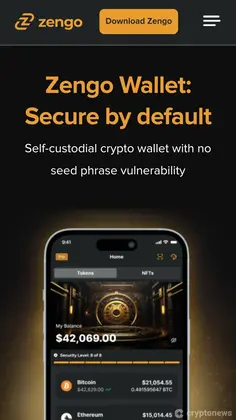
6. Ellipal Wallet – Best for Integrated DeFi and dApp Access
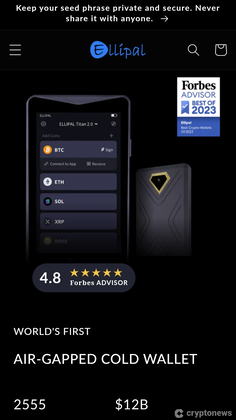
7. Ledger – Best Hardware Wallet for Long-Term Storage
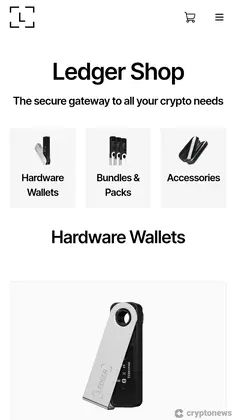
8. Trezor – Best for Open-Source Security
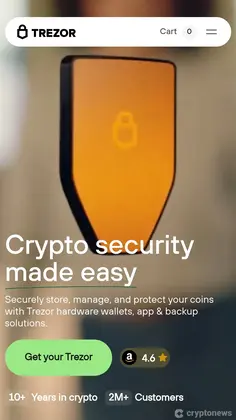
9. Blockstream Jade – Best for Bitcoin HODLers
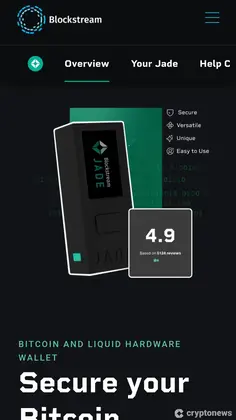
10. NGRAVE – Best for Advanced Security
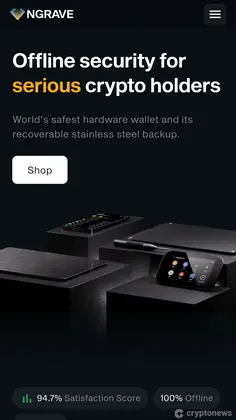
11. SecuX – Best for Touchscreen Interface

12. BitBox02 – Best Private Wallet for ERC-20 Tokens Storage
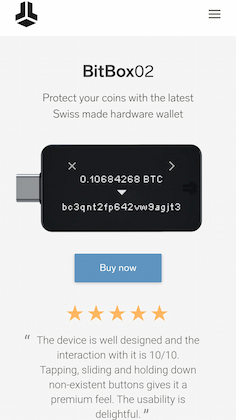
13. Coldcard Wallet – Best for Partially Signed Bitcoin Transactions (PSBT) Native Support

14. SafePal S1 Wallet – Most Cost-Effective Hardware Wallet
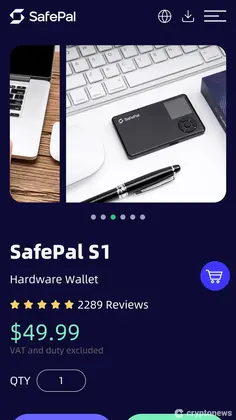
Methodology – How We Rated The Best Anonymous Crypto Wallets
If you’re still not sure which anonymous wallet is right for you, we’ll now discuss our methodology when ranking the top providers.Wallet Security (40%)
Supported Networks and Custom Tokens (20%)
Wallet Fees (20%)
Additional Wallet Features (20%)
What Are Anonymous Crypto Wallets?
Anonymous crypto wallets are designed to maximize your privacy by concealing your identity and transaction history. They let you operate without linking your identity to your wallet or transactions.How Do They Differ From Regular Crypto Wallets?
Key Differences From Other Wallet Types
How Do Non-KYC Wallets Work?
To understand how anonymous crypto wallets work, we’ll need to take a step back and discuss ‘custodianship.’ There are two types of crypto wallet services available — custodial and non-custodial (also called self-custody).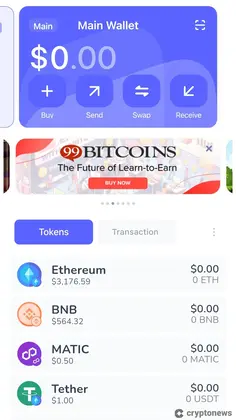
Advantages of Crypto Wallets Without ID Verification
In this section, we’ll take a much closer look at the advantages of using anonymous crypto wallets and why you should consider staying off the grid when it comes to your crypto holdings.Full Control of Your Cryptocurrencies
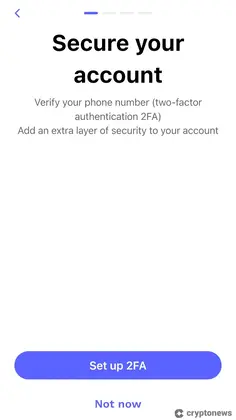
No KYC Processes – Remain Anonymous
Trade Crypto and Earn Interest Anonymously
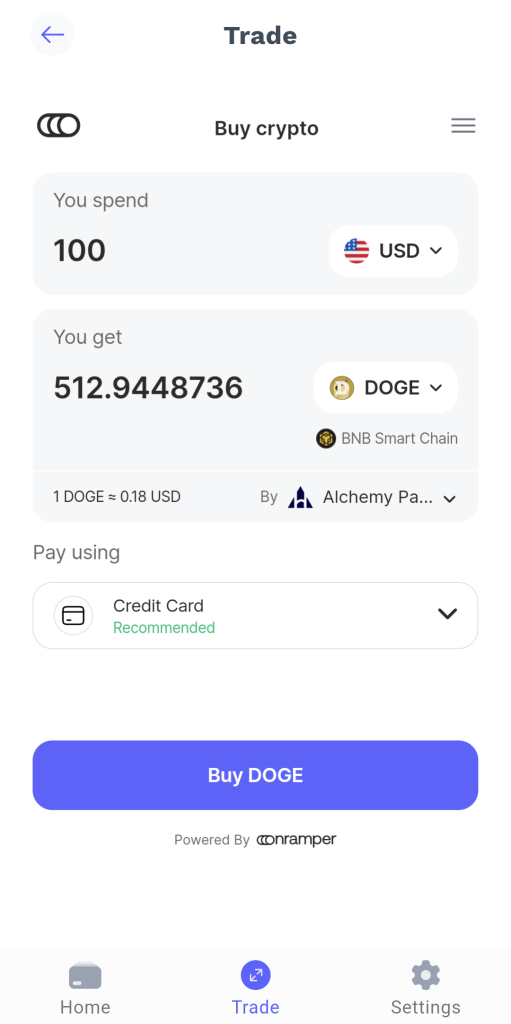
How to Store Seed Phrases Securely
A seed phrase is a sequence of 12 to 24 words that acts as a master key to your crypto wallet. It’s important to safeguard your seed phrase to access your crypto wallets and all the digital assets in it.Are Anonymous Bitcoin Wallets Legal?
In most circumstances, anonymous Bitcoin wallets are perfectly legal, and there are no restrictions on using them to store your cryptocurrency investments.Conclusion
The best anonymous crypto wallets let you store and transact cryptocurrencies without revealing your identity. Unlike conventional wallets that might require personal details, these focus on minimizing traceability by using features like encryption, decentralized systems, or air-gapped architectures.FAQs
Which crypto wallets don’t need KYC?
Does Exodus require KYC?
Can I transfer crypto without KYC?
What is the best anonymous Bitcoin wallet?
Are cold wallets or software wallets better for anonymity?
Can I run my anonymous wallet on desktop or mobile?
References
Cypherock Key Takeaways
Pros
Cons
Tangem is a card-based hardware wallet that keeps things refreshingly simple. Entirely offline, Tangem ensures that no personal data is ever at risk. Your private keys are stored securely on the card itself, thanks to an EAL6+ certified chip. What particularly impressed us about Tangem is how easy it is to use – the setup takes less than a minute, and managing your crypto is as simple as tapping the card.

The Tangem app lets you buy, sell, swap, or stake over 1,000 cryptocurrencies to earn passive income, including Bitcoin and Ethereum. Unlike software wallets like Exodus, Tangem does away with the hassle of seed phrases. Instead, it provides three backup cards to ensure you never lose access to your funds. Just be careful not to misplace those cards, as they’re the key to your assets.
Tangem is ideal for those who want a straightforward way to manage their crypto without undergoing KYC. While the card-based system might take some time getting used to, it’s worth it for the portability and security it offers. If you’re looking for an anonymous, no-frills solution to store and manage your crypto, Tangem might be exactly what you need.
Tangem Key Takeaways
- Wallet Type: Non-custodial hardware wallet
- Storage Type: Cold storage with a backup system using multiple cards
- Cryptocurrencies Supported: Over 1,000, including Bitcoin, Ethereum, and many altcoins
- Cost: $62.91 to $144
- Top Security Features: Tamper-proof EAL6+ cards, offline key generation, no seed phrase backup needed
Pros
- Super portable with its credit-card-sized design
- Quick to set up and easy to use with the Tangem app
- Affordable entry-level pricing
- Highly secure EAL6+ chip
Cons
- The card-based system might take some getting used to
- Its native app lacks a desktop version
5. Zengo – Top Anonymous Wallet With No Seed Phrase Vulnerability
Zengo is a top choice for anonymous crypto wallets in 2025, largely due to its use of Multi-Party Computation (MPC). This technology eliminates the need for seed phrases, splitting your private keys into two parts – one on your device and another on Zengo’s servers. This ensures no single entity controls your private data, significantly enhancing anonymity and security. Additionally, the wallet provides complete self-custody over your assets, ensuring you have full control.

Zengo has never been hacked since its launch in 2018, thanks to its combination of MPC, biometric login, and 3-factor authentication (3FA). It’s designed to be beginner-friendly, and you can buy, sell, and store over 380 assets, including Bitcoin and NFTs, all from the app.
The Pro version includes advanced features like generational inheritance and a Web3 firewall for enhanced protection. Despite missing support for some major assets like Solana, Zengo remains a highly secure and convenient wallet for Bitcoin users and beyond.
Zengo Key Takeaways
- Wallet Type: Non-custodial software wallet
- Storage Type: Hot storage
- Cryptocurrencies Supported: Over 380 assets, including BTC, ETH, USDT, XTZ, MATIC, and NFTs on Ethereum and Polygon
- Cost: The wallet itself is free, but using its services incurs various fees; for example, buying crypto with a credit card has a 1.5%-5.99% fee, depending on the provider
- Top Security Features: MPC, no seed phrase vulnerability, 3FA, biometric login with 3D FaceLock, and a Web3 firewall (ClearSign) that protects against phishing and smart contract risks
Pros
- Support for 380+ cryptocurrencies
- dApp marketplace with WalletConnect
- NFT viewing gallery
- Pro version with extra security features
Cons
- Not all Ethereum L2s are supported
- Crypto prices are marked up compared to market prices
6. Ellipal Wallet – Best for Integrated DeFi and dApp Access
The Ellipal Wallet is one of the best anonymous cold wallets of 2025 due to its fully air-gapped design. It achieves anonymity by eliminating any wired or wireless connections, making it impossible for hackers to access your assets or personal data remotely. All transactions occur via QR code scans, and firmware updates are done through a MicroSD card, keeping the wallet offline at all times.

This cold wallet supports over 10,000 coins and tokens, making it versatile for secure, KYC-free storage. Ellipal offers the Titan 2.0 and Titan Mini, both built from a single metal block with a sealed touchscreen for durability and protection.
Ellipal ensures your private keys never touch the internet, enhancing security for long-term asset storage. It also includes an in-built exchange through its mobile app, allowing you to swap cryptocurrencies in-app. We also found its support of 200+ dApps impressive, with easy access to crypto gaming and DeFi services via MetaMask and Wallet Connect. However, while the QR-based transaction process enhances security, it may feel slow for frequent users.
Ellipal Key Takeaways
- Wallet Type: Hardware wallet
- Storage Type: Cold storage
- Cryptocurrencies Supported: Over 10,000 coins and tokens, including BTC, ETH, SOL, MATIC, and NFTs on Ethereum and Polygon
- Cost: The Ellipal Titan 2.0 costs $169, while the smaller Titan Mini is priced at $99
- Top Security Features: Completely air-gapped, tamper-proof design, CC EAL5+ secure chip, self-destruct mechanism, PIN protection, 2FA, and a secret secondary wallet for extra safety
Pros
- Air-gapped for better online protection
- Excellent DeFi integration
- Anti-disassembly and anti-tampering features
- Supports 10,000+ digital assets
Cons
- Not all coins can be staked on the app
- QR code scanning may feel tedious
7. Ledger – Best Hardware Wallet for Long-Term Storage
Ledger achieves anonymity by keeping your private keys offline and protected with a Secure Element chip technology, preventing unauthorized access. It also doesn’t require KYC, so you can manage your crypto without revealing your identity. Ledger’s cold storage feature, coupled with offline protection, ensures that your assets are safe from both online and physical threats.

Ledger offers two entry-level models: the Ledger Nano S Plus ($79) and the Ledger Nano X ($149). The Ledger Nano X supports over 5,500 cryptocurrencies and integrates with DeFi and NFT applications. It offers mobile connectivity through Bluetooth, which is a unique feature among hardware wallets. If you prefer simplicity, the Nano S Plus is a budget option that still delivers on security. If you’re after its top-tier models, you can also pick between Ledger Flex and Ledger Stax, priced at $249 and $399, respectively.
We found Ledger ideal for long-term storage, thanks to its offline protection and 2FA. It uses a 24-word seed phrase for recovery, with the option for an additional passphrase. Although its software isn’t fully open-source, its security features are robust, making it one of the most trusted wallets for serious investors.
Ledger Key Takeaways
- Wallet Type: Hardware wallet
- Storage Type: Cold storage
- Cryptocurrencies Supported: Over 5,500 coins and tokens, including BTC, ETH, XRP, a wide range of ERC-20 tokens, and NFTs on Ethereum and Polygon
- Cost: $79 to $399
- Top Security Features: Secure Element (CC EAL5+ certified), PIN protection, Bluetooth encryption, firmware updates to counter vulnerabilities, proprietary BOLOS operating system for extra security
Pros
- High security with offline functionality
- Robust crypto education via Ledger Academy
- Multiple encryption layers for safety
- Multisignature security via Coinkite integration
Cons
- Ledger Nano S Plus has no Bluetooth connectivity
- No touchscreen on Nano models
8. Trezor – Best for Open-Source Security
Trezor achieves anonymity by not requiring KYC and deleting your personal data, such as name and address, from its online store 90 days after purchase. The device securely stores your private keys offline in cold storage, ensuring they never touch the internet. In addition, Trezor’s open-source firmware allows full transparency, which means you can audit its security measures yourself, adding trust for those concerned about privacy.

Trezor provides four models: Model One ($49), Safe 3 ($79), Model T ($149), and Safe 5 ($169), all of which support thousands of coins and tokens. Lacking native staking, NFT management, and a mobile app or Bluetooth connection, Trezor is a simple yet highly reliable anonymous wallet.
The Model T includes Shamir Backup for enhanced security, and you can access advanced features through third-party software. Trezor integrates with popular wallets like Exodus, providing flexibility and convenience. Overall, its simplicity, affordability, and open-source approach make it a reliable choice among no-KYC hardware wallets.
Trezor Key Takeaways
- Wallet Type: Hardware wallet
- Storage Type: Cold storage
- Cryptocurrencies Supported: Over 1,600 natively supported coins, with compatibility for over 9,000 tokens through third-party wallets
- Cost: $49 to $169
- Top Security Features: Open-source firmware, Shamir Backup for enhanced recovery, PIN protection, and 2FA (FIDO2)
Pros
- Most affordable hardware wallet in April 2025
- Open-source software for transparency
- User-friendly with DeFi integration
- Features touchscreen and secure updates
Cons
- Steep pricing for higher-end models
- Limited mobile compatibility
9. Blockstream Jade – Best for Bitcoin HODLers
The Blockstream Jade ensures anonymous crypto storage by not requiring KYC verification. It also facilitates offline cold storage, keeping your private keys away from the internet, and is fully open-source, which allows the community to audit its security measures.

Launched in 2021 and priced at $79, this wallet focuses primarily on Bitcoin and Liquid Network assets, offering multi-signature security with Electrum and Shamir Backup for seed recovery. The device’s open-source firmware further enhances transparency and trust.
Blockstream Jade is compact and budget-friendly compared to pricier competitors like NGRAVE. Despite its small screen and lack of microSD backup, Jade offers excellent value with its robust security features and ease of use. Another key reason we rank it among the best anonymous wallets is that you can buy it with Bitcoin, which adds an extra layer of privacy.
Learn more by watching our Blockstream Jade tutorial.
Blockstream Jade Key Takeaways
- Wallet Type: Hardware wallet
- Storage Type: Cold storage
- Cryptocurrencies Supported: Only BTC and Liquid Network assets such as L-BTC and Liquid Tether (USDt)
- Cost: $79 to $149
- Top Security Features: Air-gapped design, built-in camera for QR code transactions, multi-signature support, spoof wallets for added security, self-destructing PIN after multiple failed attempts, and fully open-source security protocols
Pros
- Affordable and compact
- Bitcoin and Liquid Network focus
- Air-gapped with QR-code scanning
- High privacy with Multisig Shield
Cons
- Limited to specific crypto assets
- Steep price increase from entry to top-tier model
10. NGRAVE – Best for Advanced Security
The NGRAVE wallet is a popular anonymous crypto wallet that doesn’t require KYC, ensuring maximum privacy. It uses air-gapped technology, which keeps it completely offline, making it immune to remote hacking. This device also offers real-time key generation using a unique light-based system, adding a physical security layer.

The NGRAVE wallet is highly secure, with military-grade encryption and biometric features like fingerprint scanning. We also liked its large touchscreen, which allows easy navigation and makes it user-friendly despite the advanced crypto security setup.
Although it’s the priciest hardware wallet on our list, NGRAVE stands out with its extensive crypto support and robust build. It supports a wide range of cryptocurrencies and is built to withstand harsh conditions, being both water- and dust-resistant. For those seeking top-tier security, NGRAVE is worth the investment.
NGRAVE Key Takeaways
- Wallet Type: Hardware wallet
- Storage Type: Cold storage
- Cryptocurrencies Supported: Over 1,500 cryptocurrencies, including BTC, ETH, LTC, SOL, and ERC-20 tokens
- Cost: $398 to $498
- Top Security Features: Biometric authentication (fingerprint), an EAL7-certified OS, full air-gapped design, QR code signing, and anti-tampering technology
Pros
- High-security EAL7 certified
- Biometric security and light sensor
- Air-gapped with 4-inch touchscreen
- Durable, tamper-resistant design
Cons
- No staking or DeFi integration
- Higher price
11. SecuX – Best for Touchscreen Interface
The SecuX W20 doesn’t require KYC and uses an air-gapped design for offline key storage. It uses a CC EAL5+ Secure Element chip to protect your private keys from online threats. This design ensures that your keys never leave the device, maintaining complete privacy.

Priced at $119, the SecuX W20 supports a whopping 10,000+ tokens, including Bitcoin, Ethereum, and Solana. We particularly enjoyed its large and responsive color touchscreen display and intuitive interface, which make managing assets straightforward. With Bluetooth and USB connectivity, the wallet is compatible with MetaMask and DeFi platforms, enhancing its versatility.
The SecuX W20 doesn’t skimp on security either, offering dynamic PIN entry and passphrase support for extra protection. You can easily view your portfolio and verify transactions directly on the device. And with a QR-based WalletConnect integration, it simplifies access to decentralized apps, making it a solid choice for secure and anonymous crypto management.
SecuX Key Takeaways
- Wallet Type: Hardware wallet
- Storage Type: Cold storage
- Cryptocurrencies Supported: Over 10,000 coins and tokens, including BTC, ETH, LTC, BNB, XRP, ERC-20 tokens, and NFTs based on ERC-721 and ERC-1155 standards
- Cost: $119 to $199
- Top Security Features: Infineon SLE CC EAL5+ Secure Element chip, dynamic PIN entry, tamper-proof sealing, 2FA during Bluetooth connections, and a 24-word recovery phrase with optional passphrase protection
Pros
- CC EAL5+ Secure Element chip for high security
- Bluetooth and USB connectivity options
- MetaMask integration via QR-based linking
- Hands-on clear-sign for transaction authorization
Cons
- Higher price compared to some competitors
- No native staking or NFT management
12. BitBox02 – Best Private Wallet for ERC-20 Tokens Storage
The BitBox02 is a top-notch anonymous hardware wallet that doesn’t require KYC verification and offers fully offline key generation. It uses open-source firmware, allowing for public audits to ensure security and privacy. With your private keys stored in a secure chip, the wallet remains protected from online threats.

BitBox02 supports Bitcoin, Ethereum, Litecoin, Cardano, and over 1,500 ERC-20 tokens, making it versatile yet straightforward. It offers DeFi support, allowing you to connect to any Ethereum-based dApp securely. This ERC-20 wallet’s design includes a user-friendly interface for both desktop and Android devices.
The OLED display is one of its standout features, offering clear transaction details for easy verification. While lacking iOS support, BitBox02 remains a top contender in security and ease of use, competing well with other hardware wallets like Ledger and Trezor.
BitBox02 Key Takeaways
- Wallet Type: Hardware wallet
- Storage Type: Cold storage
- Cryptocurrencies Supported: BTC, ETH, LTC, ADA, and over 1,500 ERC-20 tokens
- Cost: $156
- Top Security Features: Dual-chip architecture, open-source firmware, microSD card backup, encrypted USB-C connection, touch-based transaction verification, and optional Bitcoin-only firmware to reduce the attack surface
Pros
- Supports major cryptos and ERC-20 tokens.
- Affordable with advanced features.
- OLED screen, touch slider navigation.
- USB-C connector, easy setup.
Cons
- No native support for iOS.
- Limited coin support outside ERC-20
13. Coldcard Wallet – Best for Partially Signed Bitcoin Transactions (PSBT) Native Support
The Coldcard Mk4 ensures anonymity by being fully air-gapped, which means it never connects to the internet. It achieves this through offline key generation and transaction signing via microSD cards. Since it doesn’t require KYC verification or online access, your identity and keys remain completely private.

Designed exclusively for Bitcoin, the Coldcard Mk4 offers top-notch security with its open-source firmware, allowing community auditing for transparency. However, it mainly impressed us with its native PSBT support, which lets you create and sign transactions offline, keeping your private keys air-gapped and secure at all times.
Moreover, unique features like the Brick PIN mode, which bricks the device after 13 failed PIN attempts, and the time-lock functionality ensure that only you can access and spend your Bitcoin. However, Coldcard’s complex setup and lack of a mobile app may deter beginners. But despite this and its comparatively high price, it remains among our top recommendations for privacy and security-conscious Bitcoin hodlers.
Coldcard Key Takeaways
- Wallet Type: Bitcoin-only hardware wallet
- Storage Type: Cold storage
- Cryptocurrencies Supported: BTC
- Cost: $167.94 to $239.99
- Top Security Features: Dual secure element chips, open-source firmware, air-gapped design, microSD backups, advanced security features like the Brick Pin and Duress Wallet modes, multi-signature transactions, and full-node integration
Pros
- Bitcoin-only, high-security focus
- Air-gapped, dual Secure Element chip
- Transparent, open-source firmware
- Micro SD card for secure backups
Cons
- Supports Bitcoin only
- Complex setup for beginners
- No mobile app available
14. SafePal S1 Wallet – Most Cost-Effective Hardware Wallet
SafePal ensures anonymity by not requiring KYC verification and offering offline transaction confirmations, keeping your private keys away from the internet and any third parties. The wallet’s air-gapped approach enhances your privacy, ensuring that your crypto activities remain secure and anonymous.

Priced at $49.99, SafePal S1 is among the most cost-effective hardware wallets we’ve tested in 2025, supporting thousands of coins and tokens, including Bitcoin, Ethereum, and BNB. We also liked that it integrates with DeFi platforms, allowing seamless interaction with dApps. Backed by Binance Labs, SafePal’s reputation for reliability and security is well-established.
SafePal lets you store and view NFTs, making it versatile for both crypto and digital asset holders. Its EAL5+ certified secure chip, combined with a self-destruct feature, ensures that your assets are protected from physical and digital threats. This wallet’s affordability and robust features make it a strong competitor in the anonymous hardware wallet market.
SafePal Key Takeaways
- Wallet Type: Hardware wallet
- Storage Type: Cold storage
- Cryptocurrencies Supported: Over 50 blockchains and 30,000+ tokens, including BTC, ETH, and BNB, as well as NFTs across platforms like OpenSea and Rarible
- Cost: $49.99
- Top Security Features: EAL5+ certified secure element, true random number generator, multiple security sensors, and a self-destruct mechanism; no Bluetooth, WiFi, or NFC
Pros
- Top-tier security with EAL5+ certification
- Completely offline transaction confirmations
- Mobile app, browser extension, and hardware wallet options
- Supports thousands of coins and tokens
Cons
- Limited battery
- SafePal app dependency
- Lacks a dedicated desktop app
Methodology – How We Rated The Best Anonymous Crypto Wallets
If you’re still not sure which anonymous wallet is right for you, we’ll now discuss our methodology when ranking the top providers.
Wallet Security (40%)
Wallet security is critical when choosing anonymous crypto wallets because your assets must remain safe from hacks and breaches. We assessed security by reviewing encryption methods, air-gapped designs, and security features like multi-signature and two-factor authentication.
For example, some cold wallets use air-gapping, while others offer powerful encryption and PIN protection. We ranked wallets based on their ability to prevent unauthorized access and ensure anonymity, prioritizing those with no connection to online services.
Supported Networks and Custom Tokens (20%)
Supported networks and custom tokens are essential because they determine the wallet’s flexibility and compatibility with various blockchain ecosystems.
We assessed the wallets based on how many blockchains they support (e.g., Bitcoin, Ethereum, or Solana) and if they allow you to add custom tokens. Wallets that support multiple networks and let you manage diverse tokens give you more freedom and options.
Wallet Fees (20%)
Wallet fees directly impact your transaction costs. We assessed fees for sending, receiving, swapping, and purchasing cryptocurrencies across wallets.
Lower-fee wallets, like those with minimal transaction or network fees, were ranked higher. Wallets that offered fee customization options (e.g., adjusting gas fees) also scored better. By comparing fee structures, we ensure you get the best value for secure, anonymous transactions.
Additional Wallet Features (20%)
Additional wallet features enhance functionality and user experience beyond basic transactions. We assessed features like staking, NFT support, DeFi integration, and in-built crypto exchanges.
Wallets offering more capabilities, such as staking options or seamless dApp connectivity, ranked higher. These added features allow you to maximize your wallet’s utility, offering more than just storage and enabling active portfolio growth and management.
What Are Anonymous Crypto Wallets?
Anonymous crypto wallets are designed to maximize your privacy by concealing your identity and transaction history. They let you operate without linking your identity to your wallet or transactions.
They prioritize privacy features, such as using no centralized servers and often integrating with privacy-focused blockchains like Monero or Zcash. For example:
- A regular wallet like MetaMask or Trust Wallet is semi-private but linked to your IP or on-chain activity and traceable to you.
- An anonymous wallet uses coin-mixing or private-by-default chains to obscure activity.
Anonymous wallets also work with tools like Tor or VPNs for crypto trading, enhancing anonymity. They’re ideal if you value financial privacy but may be harder to recover if lost due to having no centralized backup or recovery process.
How Do They Differ From Regular Crypto Wallets?
Regular crypto wallets may require you to provide personal information (e.g., for KYC compliance), especially on regulated platforms like Coinbase or Binance. Your account is tied to your name, email, or bank details, and the wallet providers often share user data with authorities. Anonymous wallets, however, avoid such tracking by not requiring personal data at registration.
Key Differences From Other Wallet Types
The key difference is personal data. Regular wallets tie your identity to your funds; anonymous wallets keep you off the radar. But there are some wallet type-specific differences to consider:
- Regular Crypto Wallets: Often tied to exchanges and require KYC for compliance, limiting anonymity.
- Decentralized Wallets: These don’t rely on centralized entities, but some still require optional KYC, depending on features.
- Cold Wallets: Completely offline wallets (e.g., hardware wallets) that can also be anonymous if bought without identity links.
- Hot Wallets: Connected to the internet, hot wallets can be anonymous if they don’t require personal info for setup.
- Non-Custodial Wallets: Let you control your private keys. They’re anonymous only if KYC isn’t enforced.
- ERC20 Wallets: Also known as Ethereum wallets, they specialize in Ethereum-based tokens but may or may not be anonymous.
- Solana Wallets: Focused on Solana assets. Phantom is an example, but anonymity varies by wallet.
- Cardano Wallets: Support ADA. Examples like Daedalus or Yoroi may not enforce KYC.
Your choice depends on privacy needs and asset type compatibility.
How Do Non-KYC Wallets Work?
To understand how anonymous crypto wallets work, we’ll need to take a step back and discuss ‘custodianship.’ There are two types of crypto wallet services available — custodial and non-custodial (also called self-custody).
Let’s explore how each wallet type works.
Custodial wallets are offered by centralized providers. In most cases, this is a crypto exchange, such as Binance. The custodian is responsible for keeping your cryptocurrencies safe. However, there are some drawbacks.
For a start, custodian wallets rarely allow you to store cryptocurrencies anonymously. On the contrary, you’ll likely need to go through a KYC process. This means your account and wallet must be verified via government-issued ID. What’s more, custodial wallets don’t give you access to your private keys.
There’s a saying in the blockchain space — not your keys, not your coins. Many in the crypto space feel that if you don’t have access to your private keys, you never truly own your cryptocurrencies.

In contrast, non-custodial wallets don’t require any personal information, and you certainly won’t be asked for KYC documents. Instead, you can store, send, and receive cryptocurrencies anonymously. Most importantly, non-custodial wallets give you full control of your private keys.
The wallet will give you a unique blockchain address, which you’ll need when receiving tokens. As anonymous wallets are decentralized, transactions can never be blocked. Nor can your wallet balance be frozen.
However, anonymous wallets also come with drawbacks. For example, suppose you have a mobile wallet, and you forget your PIN. If you’ve also misplaced your private keys, you won’t be able to access the wallet. As you’re using a self-custody wallet, the provider cannot help you regain access. Therefore, you’re 100% responsible for safeguarding your assets.
Advantages of Crypto Wallets Without ID Verification
In this section, we’ll take a much closer look at the advantages of using anonymous crypto wallets and why you should consider staying off the grid when it comes to your crypto holdings.
Full Control of Your Cryptocurrencies
We’ve established that anonymous crypto wallets offer a self-custody service. This means that only one person has access to the wallet’s private keys — you. Without the private keys, the wallet cannot be accessed, so you have full control of your cryptocurrencies.
After all, not even the wallet provider can access your funds. What’s more, you avoid the risk of having transactions blocked or delayed. This isn’t the case when using a custodial wallet, as you need to wait for the provider to approve transactions. This goes against the ethos of cryptocurrencies and blockchain technology.

However, it’s important that you keep your private keys safe. Should they fall into the wrong hands, your wallet will be compromised and your cryptocurrencies stolen. Most anonymous crypto wallets provide private keys as a 12-word seed phrase. This makes it easier to write down and type in should you need to regain access to your wallet.
Ultimately, crypto wallets with no KYC allow you to store and build wealth away from the traditional financial system. You don’t need to trust that the provider is keeping your cryptocurrencies safe, as you’re in full control. This has never been more important since the collapse of FTX — which resulted in billions of dollars in customer losses.
The best way to keep private keys safe is by writing them down on a sheet of paper. Keep the paper somewhere safe and private. Avoid writing your private keys down on a device that connects to the internet. If you do, the private keys will be vulnerable to remote hacking attempts.
No KYC Processes – Remain Anonymous
Anonymous Bitcoin wallets don’t require going through a KYC process. You simply need to download your chosen wallet and transfer tokens to your unique address. No personal information will be collected by the provider. Using a VPN offers additional protection, as the wallet provider won’t be able to see your IP address.
When you send or receive cryptocurrencies, transactions won’t be attached to your identity. The blockchain only displays the sender’s and receiver’s wallet address, which is a long string of alphanumeric characters.
You won’t benefit from the same levels of anonymity when using a custodial wallet.
- For example, suppose you register an account with Binance and purchase Bitcoin with a credit card.
- You’d need to provide personal information and KYC documents, such as a government-issued ID.
- Thereon, any wallet transfers that you make can be tracked to your real-world identity.
This is the case even if you transfer the Bitcoin tokens to an anonymous wallet. After all, you’ve already provided your personal data to Binance, so everything can be tracked.
Trade Crypto and Earn Interest Anonymously
If you’re wondering how to buy Bitcoin anonymously with fiat money, your options will be limited. Due to anti-money laundering (AML) laws, fiat money providers must perform KYC procedures. This will be the case even if you’re using an anonymous wallet.
That being said, you will be able to trade cryptocurrencies anonymously and without KYC checks.
For example, Best Wallet comes with an in-built decentralized exchange. This allows you to swap tokens without going through a centralized entity. Let’s say you’re currently holding BNB in Best Wallet but you want to swap it to Shiba Inu.
All you need to do is swap BNB for SHIB directly in your Best Wallet dashboard. This means you don’t need to transfer funds to an exchange. You can also purchase cryptos in-app using fiat currency.

What’s more, some wallets allow you to stake cryptocurrencies anonymously. This means you can earn interest on your idle cryptocurrencies, putting your investments to work.
How to Store Seed Phrases Securely
A seed phrase is a sequence of 12 to 24 words that acts as a master key to your crypto wallet. It’s important to safeguard your seed phrase to access your crypto wallets and all the digital assets in it.
You can store a seed phrase securely just by writing it down on a piece of paper and hiding it somewhere that only you have access to. But paper and ink are susceptible to the elements and can decay over time. If you want a more long-lasting option, you can purchase a seed phrase storage device such as Cryptotag.
On Cryptotag, you can purchase three different storage devices – Zeus, Thor, and Odin. All these devices provide a compact titanium hardware storage plate for your seed phrases. The product is water-resistant, heat-resistant, and bullet-proof, ensuring maximum security in all scenarios.
Are Anonymous Bitcoin Wallets Legal?
In most circumstances, anonymous Bitcoin wallets are perfectly legal, and there are no restrictions on using them to store your cryptocurrency investments.
That said, some regulatory bodies are now honing in on no-ID crypto wallets, putting pressure on centralized exchanges to track transactions.
Crucially, anonymous crypto wallets are merely software that sits between you and the blockchain. The cryptocurrencies aren’t actually stored in the wallet itself. Moreover, self-custody wallet providers do not have access to your private keys. Therefore, they can’t block or freeze transactions, let alone obtain your real-world identity.
Conclusion
The best anonymous crypto wallets let you store and transact cryptocurrencies without revealing your identity. Unlike conventional wallets that might require personal details, these focus on minimizing traceability by using features like encryption, decentralized systems, or air-gapped architectures.
Not only do anonymous wallets allow you to store and trade cryptocurrencies privately, but you’ll be in full control of your private keys.
Overall, we rate Best Wallet as the leading crypto wallet without ID verification. The provider supports thousands of tokens, offers a built-in DEX, and is constantly upgrading its offering and adding new Web3 features.
Visit Best WalletFAQs
Which crypto wallets don’t need KYC?
Does Exodus require KYC?
Can I transfer crypto without KYC?
What is the best anonymous Bitcoin wallet?
Are cold wallets or software wallets better for anonymity?
Can I run my anonymous wallet on desktop or mobile?
References
- Best Wallet: Does Best Wallet Have a KYC Process?
- Zengo: Which assets does Zengo support?
- Ledger: Supported Coins & Tokens
- NGRAVE: Which coins are supported?
- Finra: Anti-Money Laundering (AML)
- EuroNews: Bitcoin ban: These are the countries where crypto is restricted or illegal
- Swift: The KYC process explained
- Ethereum.org: ERC-20 Token Standard
- Reuters: Behind FTX’s fall, battling billionaires and a failed bid to save crypto
- The European Parliament: Crypto-assets: green light to new rules for tracing transfers in the EU
- CNBC: EU lawmakers approve world’s first comprehensive framework for crypto regulation
- UK HM Treasury: Future financial services regulatory regime for cryptoassets
Tangem Key Takeaways
Pros
Cons
Zengo is a top choice for anonymous crypto wallets in 2025, largely due to its use of Multi-Party Computation (MPC). This technology eliminates the need for seed phrases, splitting your private keys into two parts – one on your device and another on Zengo’s servers. This ensures no single entity controls your private data, significantly enhancing anonymity and security. Additionally, the wallet provides complete self-custody over your assets, ensuring you have full control.

Zengo has never been hacked since its launch in 2018, thanks to its combination of MPC, biometric login, and 3-factor authentication (3FA). It’s designed to be beginner-friendly, and you can buy, sell, and store over 380 assets, including Bitcoin and NFTs, all from the app.
The Pro version includes advanced features like generational inheritance and a Web3 firewall for enhanced protection. Despite missing support for some major assets like Solana, Zengo remains a highly secure and convenient wallet for Bitcoin users and beyond.
Zengo Key Takeaways
Pros
Cons
The Ellipal Wallet is one of the best anonymous cold wallets of 2025 due to its fully air-gapped design. It achieves anonymity by eliminating any wired or wireless connections, making it impossible for hackers to access your assets or personal data remotely. All transactions occur via QR code scans, and firmware updates are done through a MicroSD card, keeping the wallet offline at all times.

This cold wallet supports over 10,000 coins and tokens, making it versatile for secure, KYC-free storage. Ellipal offers the Titan 2.0 and Titan Mini, both built from a single metal block with a sealed touchscreen for durability and protection.
Ellipal ensures your private keys never touch the internet, enhancing security for long-term asset storage. It also includes an in-built exchange through its mobile app, allowing you to swap cryptocurrencies in-app. We also found its support of 200+ dApps impressive, with easy access to crypto gaming and DeFi services via MetaMask and Wallet Connect. However, while the QR-based transaction process enhances security, it may feel slow for frequent users.
Ellipal Key Takeaways
Pros
Cons
Ledger achieves anonymity by keeping your private keys offline and protected with a Secure Element chip technology, preventing unauthorized access. It also doesn’t require KYC, so you can manage your crypto without revealing your identity. Ledger’s cold storage feature, coupled with offline protection, ensures that your assets are safe from both online and physical threats.

Ledger offers two entry-level models: the Ledger Nano S Plus ($79) and the Ledger Nano X ($149). The Ledger Nano X supports over 5,500 cryptocurrencies and integrates with DeFi and NFT applications. It offers mobile connectivity through Bluetooth, which is a unique feature among hardware wallets. If you prefer simplicity, the Nano S Plus is a budget option that still delivers on security. If you’re after its top-tier models, you can also pick between Ledger Flex and Ledger Stax, priced at $249 and $399, respectively.
We found Ledger ideal for long-term storage, thanks to its offline protection and 2FA. It uses a 24-word seed phrase for recovery, with the option for an additional passphrase. Although its software isn’t fully open-source, its security features are robust, making it one of the most trusted wallets for serious investors.
Ledger Key Takeaways
Pros
Cons
Trezor achieves anonymity by not requiring KYC and deleting your personal data, such as name and address, from its online store 90 days after purchase. The device securely stores your private keys offline in cold storage, ensuring they never touch the internet. In addition, Trezor’s open-source firmware allows full transparency, which means you can audit its security measures yourself, adding trust for those concerned about privacy.

Trezor provides four models: Model One ($49), Safe 3 ($79), Model T ($149), and Safe 5 ($169), all of which support thousands of coins and tokens. Lacking native staking, NFT management, and a mobile app or Bluetooth connection, Trezor is a simple yet highly reliable anonymous wallet.
The Model T includes Shamir Backup for enhanced security, and you can access advanced features through third-party software. Trezor integrates with popular wallets like Exodus, providing flexibility and convenience. Overall, its simplicity, affordability, and open-source approach make it a reliable choice among no-KYC hardware wallets.
Trezor Key Takeaways
Pros
Cons
The Blockstream Jade ensures anonymous crypto storage by not requiring KYC verification. It also facilitates offline cold storage, keeping your private keys away from the internet, and is fully open-source, which allows the community to audit its security measures.

Launched in 2021 and priced at $79, this wallet focuses primarily on Bitcoin and Liquid Network assets, offering multi-signature security with Electrum and Shamir Backup for seed recovery. The device’s open-source firmware further enhances transparency and trust.
Blockstream Jade is compact and budget-friendly compared to pricier competitors like NGRAVE. Despite its small screen and lack of microSD backup, Jade offers excellent value with its robust security features and ease of use. Another key reason we rank it among the best anonymous wallets is that you can buy it with Bitcoin, which adds an extra layer of privacy.
Learn more by watching our Blockstream Jade tutorial.
Blockstream Jade Key Takeaways
Pros
Cons
The NGRAVE wallet is a popular anonymous crypto wallet that doesn’t require KYC, ensuring maximum privacy. It uses air-gapped technology, which keeps it completely offline, making it immune to remote hacking. This device also offers real-time key generation using a unique light-based system, adding a physical security layer.

The NGRAVE wallet is highly secure, with military-grade encryption and biometric features like fingerprint scanning. We also liked its large touchscreen, which allows easy navigation and makes it user-friendly despite the advanced crypto security setup.
Although it’s the priciest hardware wallet on our list, NGRAVE stands out with its extensive crypto support and robust build. It supports a wide range of cryptocurrencies and is built to withstand harsh conditions, being both water- and dust-resistant. For those seeking top-tier security, NGRAVE is worth the investment.
NGRAVE Key Takeaways
Pros
Cons
The SecuX W20 doesn’t require KYC and uses an air-gapped design for offline key storage. It uses a CC EAL5+ Secure Element chip to protect your private keys from online threats. This design ensures that your keys never leave the device, maintaining complete privacy.

Priced at $119, the SecuX W20 supports a whopping 10,000+ tokens, including Bitcoin, Ethereum, and Solana. We particularly enjoyed its large and responsive color touchscreen display and intuitive interface, which make managing assets straightforward. With Bluetooth and USB connectivity, the wallet is compatible with MetaMask and DeFi platforms, enhancing its versatility.
The SecuX W20 doesn’t skimp on security either, offering dynamic PIN entry and passphrase support for extra protection. You can easily view your portfolio and verify transactions directly on the device. And with a QR-based WalletConnect integration, it simplifies access to decentralized apps, making it a solid choice for secure and anonymous crypto management.
SecuX Key Takeaways
Pros
Cons
The BitBox02 is a top-notch anonymous hardware wallet that doesn’t require KYC verification and offers fully offline key generation. It uses open-source firmware, allowing for public audits to ensure security and privacy. With your private keys stored in a secure chip, the wallet remains protected from online threats.

BitBox02 supports Bitcoin, Ethereum, Litecoin, Cardano, and over 1,500 ERC-20 tokens, making it versatile yet straightforward. It offers DeFi support, allowing you to connect to any Ethereum-based dApp securely. This ERC-20 wallet’s design includes a user-friendly interface for both desktop and Android devices.
The OLED display is one of its standout features, offering clear transaction details for easy verification. While lacking iOS support, BitBox02 remains a top contender in security and ease of use, competing well with other hardware wallets like Ledger and Trezor.
BitBox02 Key Takeaways
Pros
Cons
The Coldcard Mk4 ensures anonymity by being fully air-gapped, which means it never connects to the internet. It achieves this through offline key generation and transaction signing via microSD cards. Since it doesn’t require KYC verification or online access, your identity and keys remain completely private.

Designed exclusively for Bitcoin, the Coldcard Mk4 offers top-notch security with its open-source firmware, allowing community auditing for transparency. However, it mainly impressed us with its native PSBT support, which lets you create and sign transactions offline, keeping your private keys air-gapped and secure at all times.
Moreover, unique features like the Brick PIN mode, which bricks the device after 13 failed PIN attempts, and the time-lock functionality ensure that only you can access and spend your Bitcoin. However, Coldcard’s complex setup and lack of a mobile app may deter beginners. But despite this and its comparatively high price, it remains among our top recommendations for privacy and security-conscious Bitcoin hodlers.
Coldcard Key Takeaways
Pros
Cons
SafePal ensures anonymity by not requiring KYC verification and offering offline transaction confirmations, keeping your private keys away from the internet and any third parties. The wallet’s air-gapped approach enhances your privacy, ensuring that your crypto activities remain secure and anonymous.

Priced at $49.99, SafePal S1 is among the most cost-effective hardware wallets we’ve tested in 2025, supporting thousands of coins and tokens, including Bitcoin, Ethereum, and BNB. We also liked that it integrates with DeFi platforms, allowing seamless interaction with dApps. Backed by Binance Labs, SafePal’s reputation for reliability and security is well-established.
SafePal lets you store and view NFTs, making it versatile for both crypto and digital asset holders. Its EAL5+ certified secure chip, combined with a self-destruct feature, ensures that your assets are protected from physical and digital threats. This wallet’s affordability and robust features make it a strong competitor in the anonymous hardware wallet market.
SafePal Key Takeaways
Pros
Cons
If you’re still not sure which anonymous wallet is right for you, we’ll now discuss our methodology when ranking the top providers.
Wallet security is critical when choosing anonymous crypto wallets because your assets must remain safe from hacks and breaches. We assessed security by reviewing encryption methods, air-gapped designs, and security features like multi-signature and two-factor authentication.
For example, some cold wallets use air-gapping, while others offer powerful encryption and PIN protection. We ranked wallets based on their ability to prevent unauthorized access and ensure anonymity, prioritizing those with no connection to online services.
Supported networks and custom tokens are essential because they determine the wallet’s flexibility and compatibility with various blockchain ecosystems.
We assessed the wallets based on how many blockchains they support (e.g., Bitcoin, Ethereum, or Solana) and if they allow you to add custom tokens. Wallets that support multiple networks and let you manage diverse tokens give you more freedom and options.
Wallet fees directly impact your transaction costs. We assessed fees for sending, receiving, swapping, and purchasing cryptocurrencies across wallets.
Lower-fee wallets, like those with minimal transaction or network fees, were ranked higher. Wallets that offered fee customization options (e.g., adjusting gas fees) also scored better. By comparing fee structures, we ensure you get the best value for secure, anonymous transactions.
Additional wallet features enhance functionality and user experience beyond basic transactions. We assessed features like staking, NFT support, DeFi integration, and in-built crypto exchanges.
Wallets offering more capabilities, such as staking options or seamless dApp connectivity, ranked higher. These added features allow you to maximize your wallet’s utility, offering more than just storage and enabling active portfolio growth and management.
Anonymous crypto wallets are designed to maximize your privacy by concealing your identity and transaction history. They let you operate without linking your identity to your wallet or transactions.
They prioritize privacy features, such as using no centralized servers and often integrating with privacy-focused blockchains like Monero or Zcash. For example:
Anonymous wallets also work with tools like Tor or VPNs for crypto trading, enhancing anonymity. They’re ideal if you value financial privacy but may be harder to recover if lost due to having no centralized backup or recovery process.
Regular crypto wallets may require you to provide personal information (e.g., for KYC compliance), especially on regulated platforms like Coinbase or Binance. Your account is tied to your name, email, or bank details, and the wallet providers often share user data with authorities. Anonymous wallets, however, avoid such tracking by not requiring personal data at registration.
The key difference is personal data. Regular wallets tie your identity to your funds; anonymous wallets keep you off the radar. But there are some wallet type-specific differences to consider:
Your choice depends on privacy needs and asset type compatibility.
To understand how anonymous crypto wallets work, we’ll need to take a step back and discuss ‘custodianship.’ There are two types of crypto wallet services available — custodial and non-custodial (also called self-custody).
Let’s explore how each wallet type works.
Custodial wallets are offered by centralized providers. In most cases, this is a crypto exchange, such as Binance. The custodian is responsible for keeping your cryptocurrencies safe. However, there are some drawbacks.
For a start, custodian wallets rarely allow you to store cryptocurrencies anonymously. On the contrary, you’ll likely need to go through a KYC process. This means your account and wallet must be verified via government-issued ID. What’s more, custodial wallets don’t give you access to your private keys.
There’s a saying in the blockchain space — not your keys, not your coins. Many in the crypto space feel that if you don’t have access to your private keys, you never truly own your cryptocurrencies.

In contrast, non-custodial wallets don’t require any personal information, and you certainly won’t be asked for KYC documents. Instead, you can store, send, and receive cryptocurrencies anonymously. Most importantly, non-custodial wallets give you full control of your private keys.
The wallet will give you a unique blockchain address, which you’ll need when receiving tokens. As anonymous wallets are decentralized, transactions can never be blocked. Nor can your wallet balance be frozen.
However, anonymous wallets also come with drawbacks. For example, suppose you have a mobile wallet, and you forget your PIN. If you’ve also misplaced your private keys, you won’t be able to access the wallet. As you’re using a self-custody wallet, the provider cannot help you regain access. Therefore, you’re 100% responsible for safeguarding your assets.
In this section, we’ll take a much closer look at the advantages of using anonymous crypto wallets and why you should consider staying off the grid when it comes to your crypto holdings.
We’ve established that anonymous crypto wallets offer a self-custody service. This means that only one person has access to the wallet’s private keys — you. Without the private keys, the wallet cannot be accessed, so you have full control of your cryptocurrencies.
After all, not even the wallet provider can access your funds. What’s more, you avoid the risk of having transactions blocked or delayed. This isn’t the case when using a custodial wallet, as you need to wait for the provider to approve transactions. This goes against the ethos of cryptocurrencies and blockchain technology.

However, it’s important that you keep your private keys safe. Should they fall into the wrong hands, your wallet will be compromised and your cryptocurrencies stolen. Most anonymous crypto wallets provide private keys as a 12-word seed phrase. This makes it easier to write down and type in should you need to regain access to your wallet.
Ultimately, crypto wallets with no KYC allow you to store and build wealth away from the traditional financial system. You don’t need to trust that the provider is keeping your cryptocurrencies safe, as you’re in full control. This has never been more important since the collapse of FTX — which resulted in billions of dollars in customer losses.
The best way to keep private keys safe is by writing them down on a sheet of paper. Keep the paper somewhere safe and private. Avoid writing your private keys down on a device that connects to the internet. If you do, the private keys will be vulnerable to remote hacking attempts.
Anonymous Bitcoin wallets don’t require going through a KYC process. You simply need to download your chosen wallet and transfer tokens to your unique address. No personal information will be collected by the provider. Using a VPN offers additional protection, as the wallet provider won’t be able to see your IP address.
When you send or receive cryptocurrencies, transactions won’t be attached to your identity. The blockchain only displays the sender’s and receiver’s wallet address, which is a long string of alphanumeric characters.
You won’t benefit from the same levels of anonymity when using a custodial wallet.
This is the case even if you transfer the Bitcoin tokens to an anonymous wallet. After all, you’ve already provided your personal data to Binance, so everything can be tracked.
If you’re wondering how to buy Bitcoin anonymously with fiat money, your options will be limited. Due to anti-money laundering (AML) laws, fiat money providers must perform KYC procedures. This will be the case even if you’re using an anonymous wallet.
That being said, you will be able to trade cryptocurrencies anonymously and without KYC checks.
For example, Best Wallet comes with an in-built decentralized exchange. This allows you to swap tokens without going through a centralized entity. Let’s say you’re currently holding BNB in Best Wallet but you want to swap it to Shiba Inu.
All you need to do is swap BNB for SHIB directly in your Best Wallet dashboard. This means you don’t need to transfer funds to an exchange. You can also purchase cryptos in-app using fiat currency.

What’s more, some wallets allow you to stake cryptocurrencies anonymously. This means you can earn interest on your idle cryptocurrencies, putting your investments to work.
A seed phrase is a sequence of 12 to 24 words that acts as a master key to your crypto wallet. It’s important to safeguard your seed phrase to access your crypto wallets and all the digital assets in it.
You can store a seed phrase securely just by writing it down on a piece of paper and hiding it somewhere that only you have access to. But paper and ink are susceptible to the elements and can decay over time. If you want a more long-lasting option, you can purchase a seed phrase storage device such as Cryptotag.
On Cryptotag, you can purchase three different storage devices – Zeus, Thor, and Odin. All these devices provide a compact titanium hardware storage plate for your seed phrases. The product is water-resistant, heat-resistant, and bullet-proof, ensuring maximum security in all scenarios.
In most circumstances, anonymous Bitcoin wallets are perfectly legal, and there are no restrictions on using them to store your cryptocurrency investments.
That said, some regulatory bodies are now honing in on no-ID crypto wallets, putting pressure on centralized exchanges to track transactions.
Crucially, anonymous crypto wallets are merely software that sits between you and the blockchain. The cryptocurrencies aren’t actually stored in the wallet itself. Moreover, self-custody wallet providers do not have access to your private keys. Therefore, they can’t block or freeze transactions, let alone obtain your real-world identity.
The best anonymous crypto wallets let you store and transact cryptocurrencies without revealing your identity. Unlike conventional wallets that might require personal details, these focus on minimizing traceability by using features like encryption, decentralized systems, or air-gapped architectures.
Not only do anonymous wallets allow you to store and trade cryptocurrencies privately, but you’ll be in full control of your private keys.
Overall, we rate Best Wallet as the leading crypto wallet without ID verification. The provider supports thousands of tokens, offers a built-in DEX, and is constantly upgrading its offering and adding new Web3 features.
There are many reputable and secure crypto wallets that don’t require personal information or KYC documents. Examples include Best Wallet, Ellipal, Zengo, and Ledger.
Exodus is a self-custody wallet that doesn’t require KYC to store, send, or receive cryptocurrencies. However, KYC will be required if you want to buy cryptocurrencies with a debit/credit card.
Yes, if you’re using a self-custody wallet, you can transfer crypto without KYC. However, an increasing number of custodian wallet providers now have verification processes in place.
We rate Best Wallet as the best anonymous Bitcoin wallet. You can store, send, and receive thousands of coins, stake tokens to earn interest, and much more, all with no ID.
Both cold wallets and software wallets have a wide range of choices that can keep you anonymous, but cold wallets are ultimately the best choice as they’re not obviously connected to any device through which your identity could be discovered. On the other hand, software wallets are usually on a particular device, which may reveal your identity elsewhere.
Some wallets come as mobile apps for iOS and Android. Others come as desktop software for Windows and Mac. Anonymous wallets are also available as browser extensions for Chrome and Firefox.
Get dialed in every Tuesday & Friday with quick updates on the world of crypto
Our goal is to offer a comprehensive and objective perspective on the cryptocurrency market, enabling our readers to make informed decisions in this ever-changing landscape.
Our editorial team of more than 70 crypto professionals works to maintain the highest standards of journalism and ethics. We follow strict editorial guidelines to ensure the integrity and credibility of our content.
Whether you’re looking for breaking news, expert opinions, or market insights, Cryptonews has been your go-to destination for everything cryptocurrency since 2017.
Get dialed in every Tuesday & Friday with quick updates on the world of crypto
The information on this website is for educational purposes only, and investing carries risks. Always do your research before investing, and be prepared for potential losses.
18+ and Gambling: Online gambling rules vary by country; please follow them. This website provides entertainment content, and using it means you accept out terms. We may include partnership links, but they don’t affect our ratings or recommendations.
Crypto promotions on this site do not comply with the UK Financial Promotions Regime and are not intended for UK consumers.
source





